- Home
- Harlan Coben
Run Away Page 15
Run Away Read online
Page 15
“It could be,” Nap said. “But my bet is the shooter came out from the woods. Look at this angle.”
Elena nodded.
“It’s possible,” Nap continued, “that the killer could have driven in earlier, parked, and then hidden in the woods. But I don’t think so.”
“Why not?”
“Because there was only one other person here at the time of the shooting—the second victim, Ryan Bailey. Bailey doesn’t own a car. He takes the bus from the mall and walks.”
She glanced around, subtracted out the cop cars both marked and unmarked. “So when the first responders got here, were any cars in the lot other than Gorse’s?”
“None,” Nap said. “The lot was empty.”
Elena stood back up. “So if someone—say, the killer—drove in and parked in the lot, Gorse would have noticed it when he left.”
“Agree,” Nap said. “Damien Gorse is the owner. It’s closing time. If a strange car is in his lot, I think he’d walk over and check it out. Unless there was a getaway driver.”
Elena frowned. “Getaway driver?”
“I use all the cool cop lingo. Either way, we will go through all relevant nearby CCTV footage.”
“I understand one of the two victims called nine-one-one.”
“Ryan Bailey. The second victim.”
“What did he say on the call?”
“Nothing.”
“Nothing?”
Nap explained his working theory. The shooter kills Damien Gorse by the Ford Fusion. The shooter starts going through the dead man’s pockets; takes the money, the watch, the wallet; and he is pulling off Gorse’s jewelry when the door opens and Ryan Bailey comes out. Bailey sees what’s happening, runs back inside, hits the alarm, and hides in the closet.
Elena frowned.
“What?” Nap asked.
“Bailey sets off an alarm inside the tattoo parlor?”
Nap nodded. “The panic button is right near the back door.”
“Is it a silent alarm?” she asked.
“No.”
“Loud?”
“The alarm? Yeah. Really loud.”
Elena frowned again.
“What?”
“Show me,” she said.
“Show you what?”
“Inside. The closet where Ryan Bailey hid.”
Nap studied her for a moment. Then he handed her a pair of crime-scene gloves. She snapped them on. He did the same. They walked toward the back entrance.
“Full garbage bag,” Nap said, pointing to one lying split on the ground. “We figured Bailey came out to throw it in the dumpster.”
“And that was when he interrupted the robbery?”
“That’s our theory.”
Except it didn’t make sense.
Another cop handed them each a white crime-scene suit with footies. Elena slipped hers on over her suit. All white—they both looked like giant sperms. There were more white-covered lab guys inside. The closet was adjacent to the back door.
Elena frowned again.
“What?”
“It doesn’t add up.”
“Why not?”
“You figure Ryan Bailey came outside to throw away the garbage.”
“Right.”
“He spots our killer looting Gorse’s body.”
“Right.”
“So our perp didn’t know the kid was inside. That’s most likely.”
“I don’t know, probably. So what?”
“So Ryan Bailey goes outside. He spots the killer. He runs back in and hits the alarm. Then he hides in the closet.”
“Right.”
“And our killer is in hot pursuit, right?”
“Right.”
“So our killer follows him inside. The killer searches for him. All the while, this alarm is blaring.”
“Yeah, so?”
“Why?” she asked.
“What do you mean, why? Ryan Bailey had spotted the killer. He could identify him.”
“So our killer wanted to silence him?”
“Yes.”
“So that sort of rules out a professional hit job,” Elena said.
“How so?”
“Do you know any pro that wouldn’t have been wearing a ski mask or some kind of disguise? A pro would have run when the alarm went off. Because what could the kid tell us? A man wearing a ski mask killed his boss? That’s it. The only reason the killer would follow him in and kill him is that Ryan Bailey could identify him.”
Nap nodded. “Or maybe it was someone they both knew.”
“Either way,” Elena said, “I don’t think it fits in with my case. My guy would be a pro. He’d use a mask.”
“So what is your case?”
And then she spotted the computer on top of the counter. She didn’t know who Henry Thorpe had been in touch with—just that the communications came from an IP address and Wi-Fi located in this building.
Elena turned to Nap. “Can I take a look at that computer?”
Chapter
Seventeen
Enid Corval and Simon were comfortably ensconced on the ripped fabric of a corner booth in this “private club.”
Simon had already put most of it together. Not about Aaron’s mother. He had no idea about that. But about this club. They were selling something out back. Drugs probably. This wasn’t a pub or bar. It was a private club. Different regulations. The inn was her front, her legitimacy, and probably where she laundered a lot of the money from here.
He might, of course, be way off in his assumptions. His theorizing, if you wanted to call it that, didn’t even raise itself to the level of flimsy conjecture, and either way, he wasn’t going to bring it up unless he absolutely needed to.
But the theory felt right to him.
“Wiley and me, our marriage is kind of old-fashioned.” She stopped, shook her head. “Don’t know why I’m telling you this. I’m getting older, I guess. Aaron is dead. And maybe you’re right, Mr. Greene.”
“Simon.”
“I prefer Mr. Greene.”
“Maybe I’m right about what?”
Enid spread her hands. “Maybe it’s all related. That stuff in the past. And now. Who am I to say?”
Simon waited, but not long. Enid dove in.
“I’m not from around here. I grew up in Billings, Montana. You don’t need to hear the tale of how I ended up in this part of Connecticut. The winds blow, as they do. That’s life. But when I met Wiley he had a nine-year-old son named Aaron. A lot of women found all that attractive. The single-father thing. Raising the boy on his own. The beautiful inn and farm. Someone would ask Wiley about the boy and what happened to his mother, but he’d politely shake them off. Didn’t like to talk about it. Used to get a tear in his eye. Even with me.”
“But eventually?”
“Oh, I’d heard the story before he told me. Everyone around here knew parts of it. Wiley and the boy’s mother met during a time in his life when he didn’t want anything to do with the inn. Like everyone else who grows up here, Wiley longed to escape. So he started backpacking through Europe and met a girl in Italy. Her name was Bruna. Tuscany. That was what Wiley told me. The two worked in a vineyard for a while. He said working in the vineyard was a little like working on the inn. It reminded him of it anyway. Made him long for home a little, that’s what he said.” She gestured at the Pabst can with her chin. “You’re not drinking your beer.”
“I have to drive.”
“Two beers? Come on, you’re not that big a girl.”
But he was. Ingrid could drink hard liquor for hours and show no signs of it. Simon had two beers and tried to French-kiss a light socket.
“So what happened?”
“They fell in love. Wiley and Bruna. Romantic, right? They had a boy. Aaron. A blissful story until, well, Bruna died.”
“She died?”
Enid kept still. Too still.
“How?” he asked.
“Car accident. Head-on collision on Auto
strada A11, and yeah, Wiley always added that detail. Autostrada A11. I looked it up once. Don’t know why. It connects Pisa to Florence. Bruna was going to visit her family, he said. And he didn’t want to go. They had a fight about it before she left. See, Wiley was supposed to have been in the car with her. That’s what he said. So he blames himself. It’s very hard for him to talk about. He gets all choked up.”
She looked at him over her glass.
“You sound skeptical,” Simon said.
“Do I?”
“Yes.”
“Wiley tells the story with gusto. He’s quite theatrical, my husband. You’d believe every word.”
“You didn’t?”
“Oh, I believed it. But see, I also wondered why Bruna would go to visit her family and not bring her infant son. You’d do that, right? You’re a young mom, traveling the”—she made quote marks with her fingers—“‘autostrada’ to see your family. You’d take your baby.”
“Did you ask Wiley about that?”
“No, I never said anything. I mean, why would I? Who’d question a story like that?”
There was a chill in the stale-beer air. Simon wanted to ask a follow-up, but more than that, he wanted Enid to tell it. He kept silent.
“Wiley came back home after the accident. Here. The inn, I mean. He was afraid that maybe Bruna’s family would sue for custody or hold him up—they’d never been legally married or anything—so he flew to the States with the baby. They moved into the inn…”
Her voice faded out as she shrugged.
End of the story.
“So,” Simon said, “Aaron’s mother is dead.”
“That’s what Wiley says.”
“But when I asked you if she was alive, you said you didn’t know.”
“You’re a quick one, Mr. Greene.” She raised her glass and smiled. “Why the hell am I telling you any of this?”
She stared at him and waited for an answer.
“Because I have an honest face?” Simon tried.
“You look like my first husband.”
“Was he honest?”
“Shit no.” Then: “But oh, man, he was great in bed.”
“So we have something in common.”
Enid snorted. “I like you, Mr. Greene. And ah, what the hell. I can’t see how it will help you and yet…I’ve seen some strange shit. And bad stays. Bad doesn’t go away. You bury bad, it digs itself out. You throw bad in the middle of the ocean, it comes back at you like a tidal wave.”
Simon just waited.
“Do you keep your old passports?” she asked him. “I mean, after they’re expired?”
“Yes.”
In fact, Simon advised his clients to do the same, just in case they ever needed to prove they’d been someplace. He was big on saving any official paperwork, because you never knew.
“So does Wiley. Not where someone could easily find them. They’re boxed up in storage in the basement. But I found them. And you know what?”
“What?”
Enid put her hand to the side of her mouth and stage-whispered, “Wiley has never been to Italy.”
* * *
The office at Tattoos While U Wait was glass enclosed, so whoever sat in it could look out at the chairs and the artists and the waiting area and vice versa. The computer’s monitor faced a wall, however, so that while privacy was pretty much nonexistent, you couldn’t see what the person sitting at the desk may have been surfing or browsing or whatever people called it nowadays.
The desk was partner-style, so that two people could sit facing each other. The top was cluttered with scraps of paper, three pairs of drugstore reading glasses, a dozen or so assorted pens and markers. There was a bag of cherry cough drops on the left, a few paperback books, bills strewn about with no reason or guiding principle behind them.
In the center of the desk, facing the glass, was a slightly faded photograph of six men with huge smiles. Two were up front, with arms around each other’s shoulders, the other four slightly behind them with folded arms. It’d been snapped in front of the parlor—opening day from the looks of the ribbons and the oversized faux scissors. The clothes, the facial hair, the poses—the whole vibe made it feel like a Doobie Brothers album cover.
Elena picked up the photograph and showed it to Nap. Nap nodded and pointed to the guy in the front on the right.
“That’s the victim. Damien Gorse.”
Nap slid his finger toward the guy next to him—a hefty dude in full leather motorcycle wear and a salt-’n’-pepper handlebar mustache. “That’s the partner, Neil Raff.”
Elena sat in the swivel chair in front of the monitor. The computer’s mouse was red and in the shape of a heart. For a moment Elena just stared at it. A heart. Damien Gorse’s computer mouse was in the shape of a heart. As an investigator, you keep your head down and you think analytically because that was often the best. You focus on your particular goal—in this case finding Henry Thorpe—but Joel had always told her not to forget the devastation, the lives lost or destroyed or irrevocably torn apart. Damien Gorse had sat in this chair and used this heart-shaped mouse. The heart-shaped mouse was a gift—it had to be, it was not the kind of thing you buy for yourself—and the person who gave it to him wanted Damien to know that he was in some way loved.
“Don’t let those emotions cloud you,” Joel would tell her. “Let them fuel you.”
When Elena touched the mouse, the screen lit up. A photograph appeared of Damien Gorse and Neil Raff, with an older woman between the two. They were on a beach somewhere, all smiles.
In the center of the screen was a box asking for a password. Elena looked over at Nap as if he might know. He shrugged no-idea at her. There were Post-it notes all over the computer. She scanned them for what might be a password, but nothing jumped out at her. She opened the top drawer. Nothing.
“You have someone who can crack this?” she asked.
“Yeah, but he’s not here yet.”
The front door flew open, and a man she recognized from the photographs as Neil Raff burst into his own tattoo parlor. The outfit was denim now rather than leather—almost more dated than in the photograph—and the handlebar mustache was now full-on salt. But there was no mistaking him for anyone else. Dazed, he turned his head and looked about his own business, as though seeing it for the first time, through red-tinged, swollen-from-crying eyes.
Nap hurried over to the man. Elena watched. Nap put a hand on the man’s shoulder and lowered his head and talked softly. Nap was good. Again, something in the way Nap carried himself brought on Joel’s echo. It stirred her. God, she missed Joel. Every part of him. She missed the conversations, the company, the heart, but right now she couldn’t help but think of how much she missed the sex. This may sound odd to some, but making love to Joel was the greatest thing she would ever do. She missed the weight of him on her. She missed the way he looked at her when he was inside her, as if she were the only woman on God’s green earth. She missed—and this wasn’t very feminist of her—the way Joel towered over her and made her feel safe.
She was thinking this because it suddenly dawned on her, as she looked at the photographs of Gorse and Raff, as she thought back to what Nap had said about the owners taking the cash home to their safe, and as she watched the devastation on the face of Neil Raff, that she recognized this particular grief, the gut-wrenching, all-consuming devastation of losing a life partner rather than a friend or business partner.
She could be projecting, but she didn’t think so.
Nap got Raff seated on a leather couch in the waiting area. He wheeled over a chair and sat right in front of the grieving man. Nap had a notepad in his hand, but he didn’t want to risk appearing anything less than completely focused and sympathetic, so he took no notes. Elena waited. There wasn’t much else to do.
Half an hour later, after she offered her condolences, Elena moved the heart-shaped mouse again, waking up the screen. The photograph appeared.
“Oh God,” Raff said.
He turned to Nap. “Has anyone told Carrie?”
“Carrie?”
“Damien’s mother. Oh my God, she’s going to be devastated.”
“How could we reach her?”
“Let me call her.”
Nap didn’t reply to that.
Raff said, “She lives in a condo in Scottsdale now. On her own. Damien is all she has.”
Is, Elena thought. Is all she has. Still using present tense. Common.
“Did Damien have siblings?” Nap asked.
“No siblings. Carrie couldn’t have kids. Damien was adopted.”
“And his father?”
“Out of the picture. His parents had a nasty divorce when he was three. His adoptive father hasn’t been part of Damien’s life since.”
Elena pointed to the white box on the screen. “Do you know Damien’s password?”
Raff blinked and looked away. “Of course I know his password.”
“Could you tell me what it is?”
He blinked some more, his eyes brimming with tears. “Guanacaste.”
He spelled it for her.
“It’s a province in Costa Rica,” Raff said.
“Oh,” Elena said because she wasn’t sure what else to say.
“We…we honeymooned there. It’s our favorite spot.”
Elena hit the Return key and waited for the icons to appear on the screen.
“What are you looking for?” Raff asked.
“This was Damien’s computer?”
“It’s our computer, yes.”
Again with the present tense.
“Are there any other computers on your network?” she asked.
“No.”
“How about clients? Could they access your network?”
“No. It’s password protected.”
“And this is the only computer on it?”
“Yes. Damien and I shared it, though I’m not really good with technology. Sometimes I would sit here and use it, and then Damien would sit on the other side of the desk. But most of the time, it was Damien’s.”
Elena was not great with technology either—that was why her firm had Lou—but she knew the basics. She brought up the browser and started checking the history. Neil Raff had been in Miami for the past five days, so all the recent surfing would have been done by Damien Gorse.

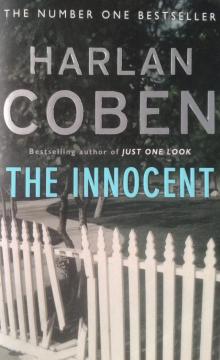 The Innocent
The Innocent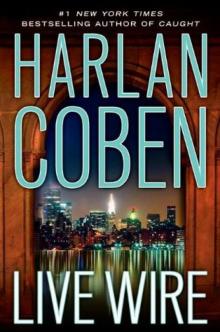 Live Wire
Live Wire Play Dead
Play Dead Drop Shot
Drop Shot Seconds Away
Seconds Away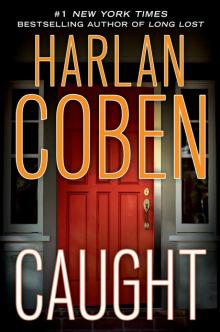 Caught
Caught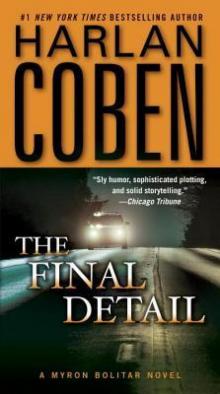 The Final Detail
The Final Detail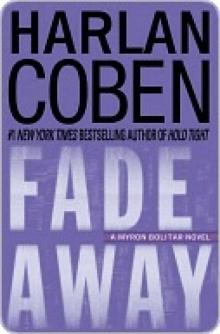 Fade Away
Fade Away Home
Home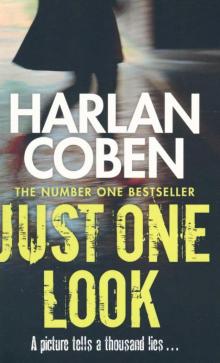 Just One Look
Just One Look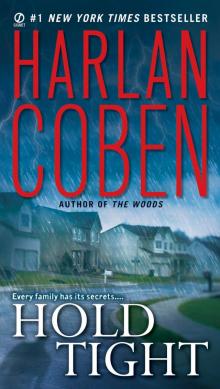 Hold Tight
Hold Tight Fool Me Once
Fool Me Once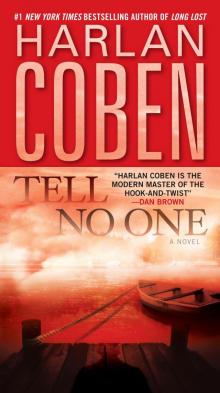 Tell No One
Tell No One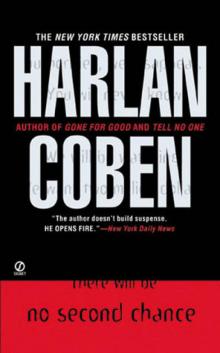 No Second Chance
No Second Chance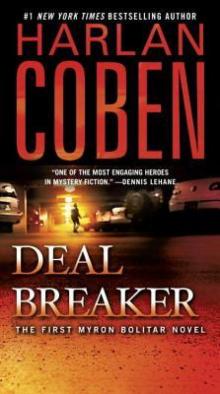 Deal Breaker
Deal Breaker Long Lost
Long Lost One False Move
One False Move The Woods
The Woods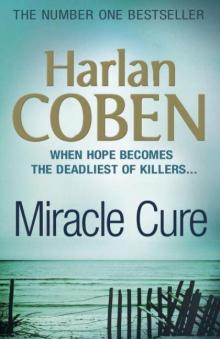 Miracle Cure
Miracle Cure Found
Found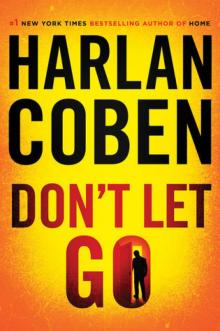 Don't Let Go
Don't Let Go Darkest Fear
Darkest Fear The Stranger
The Stranger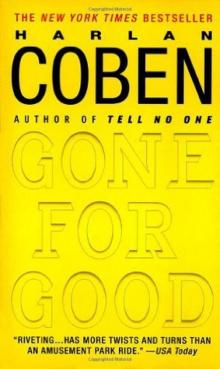 Gone for Good
Gone for Good Back Spin
Back Spin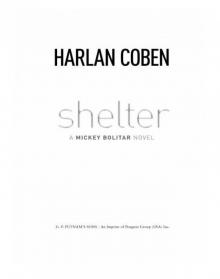 Shelter
Shelter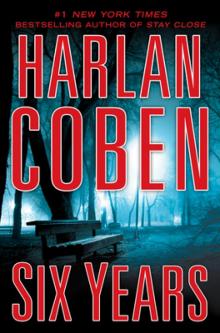 Six Years
Six Years The Boy from the Woods
The Boy from the Woods Missing You
Missing You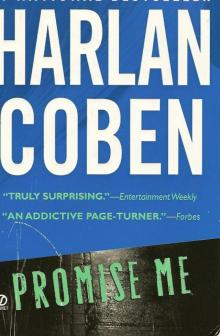 Promise Me mb-8
Promise Me mb-8 The Final Detail: A Myron Bolitar Novel
The Final Detail: A Myron Bolitar Novel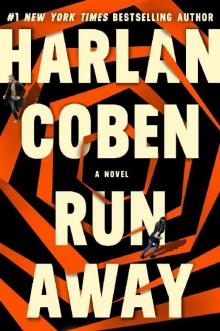 Run Away
Run Away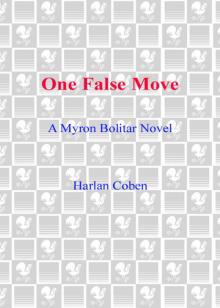 One False Move: A Myron Bolitar Novel
One False Move: A Myron Bolitar Novel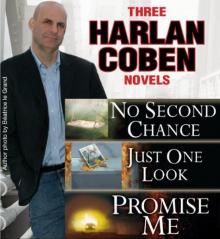 Three Harlan Coben Novels
Three Harlan Coben Novels the Woods (2007)
the Woods (2007) Tell No One (2001)
Tell No One (2001) the Innocent (2005)
the Innocent (2005)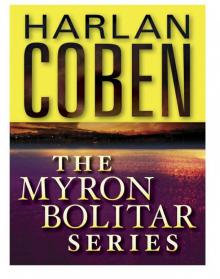 The Myron Bolitar Series 7-Book Bundle
The Myron Bolitar Series 7-Book Bundle Gone for Good (2002)
Gone for Good (2002) Caught (2010)
Caught (2010) Hold Tight (2008)
Hold Tight (2008)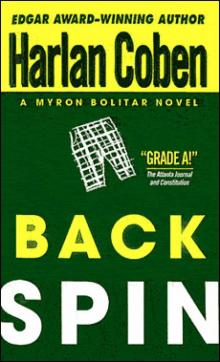 04 - Back Spin
04 - Back Spin Miracle Cure (1991)
Miracle Cure (1991) Harlan Coben 3 Novel Collection
Harlan Coben 3 Novel Collection Just One Look (2004)
Just One Look (2004)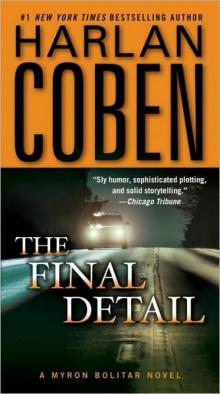 The Final Detail mb-6
The Final Detail mb-6 Play Dead (2010)
Play Dead (2010)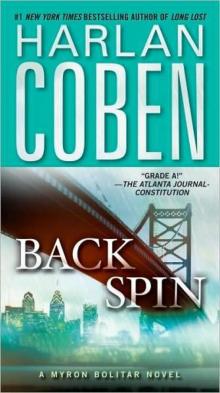 Back Spin mb-4
Back Spin mb-4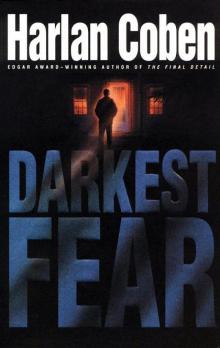 Darkest Fear mb-7
Darkest Fear mb-7